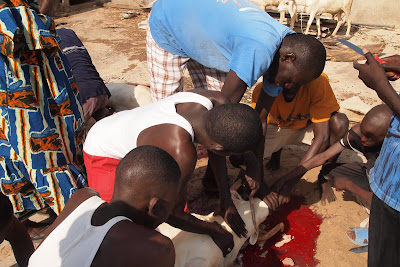Guinean Adventure

I am going to start with the end of my journey, which made quite an impression on my résumé of adventures and recount in reverse. So here it goes: For those of you who were alive in the 70’s, I am sure you remember the hatchbacks of that era. Have you wondered what happened to all those vehicles once in circulation? I’m sure that some were junked, but the rest ended up in West Africa, in Guinea in particular. I had the pleasure of riding in two different bush taxis as they are called in Guinea on my way out. A testimony to the ingenuity of man, these vehicles stand the test of time and circumstances, much like the Guinean mechanics, swarthy men and tough kids. It seems as if travel by land in Guinea (and Africa in general, but to remain close to my personal account, I will be precise in saying Guinea) is indelibly memorable due to its extreme nature and harsh conditions, particularly the roads. Guinean roads are poorly if at all paved. The paved roads have so many potholes that you h







